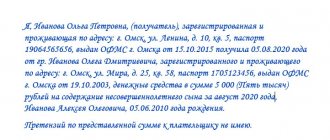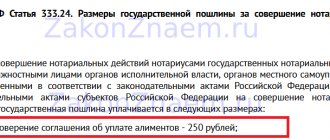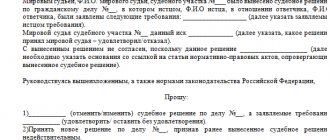Contents of the agreement on payment of alimony for the maintenance of parents
Within the framework of Art. 87 of the RF IC, adult children who are able to work are obliged to support their disabled parents who need help. Consequently, minor children who have been emancipated or married are not required to support their parents. And you cannot enter into an agreement with them on the payment of alimony .
The agreement is drawn up in writing and undergoes notarization . The agreement must contain the following information:
- names of the parties indicating passport details;
- subject of the agreement (indicating the reason for concluding the agreement);
- the size of the conditions, methods and procedure for paying alimony;
- rights and obligations of the parties;
- conditions for changing and terminating the agreement;
- liability for late payment of alimony;
- duration of the agreement;
- signatures of the parties.
The agreement can stipulate who will bear the costs of notarization and in what order.
If one of the parties to an agreement on the payment of alimony is declared legally incompetent (Article 29 of the Civil Code of the Russian Federation), then in this case the agreement is signed by its legal representative (guardian). If the agreement is signed personally by a person declared incompetent, then it, in accordance with Art. 171 of the Civil Code of the Russian Federation is recognized as void.
If an agreement is concluded with a person of limited legal capacity, then he must have the consent of the trustee , otherwise, the concluded agreement on the payment of alimony will also be declared invalid (Article 176 of the Civil Code of the Russian Federation).
When certifying an agreement on payment of alimony, the notary is not obliged to determine the disability of the parents and the financial situation of both parties.
Features of drawing up an agreement
It is necessary to have the completed document certified by an employee of a notary agency - without this, the agreement has no legal force. If the parties have drawn up an ordinary written document, after which one of the parties to the agreement ceases to comply with the conditions specified in it, then the person whose property rights have been violated will not be able to apply to the FSSP with a request to collect alimony forcibly.
It is recommended to order the drafting of the document text from a notary, albeit for an additional fee for his services. If the agreement is drawn up with errors, and its provisions violate the property rights of the parent or minor, then the notary agency employee will refuse to certify this document.
Form of agreement on payment of child support to parents
Art. 100 of the RF IC provides that in order to correctly draw up an agreement on alimony and, in the future, to ensure that relatives do not have claims against each other, it is necessary to contact a notary. The latter carries out a legal review of the document and makes sure that each party has the right to conclude such a document.
If the parties have drawn up and signed an agreement without notarizing it , then the agreement to pay alimony to parents is considered void . That is, it is declared invalid from the moment of its conclusion. The presence of one simple written form for an agreement on the payment of alimony is not enough, since it does not acquire legal force (Clause 1 of Article 165 of the Civil Code of the Russian Federation, Article 167 of the Civil Code of the Russian Federation).
Example
Between Mitryukhin Yu.P. and his daughter entered into a notarized agreement on the payment of alimony. 2 months after the conclusion of the agreement, the daughter was given a promotion at work, at the insistence of Yu.P. Mitryukhin. an amendment to the agreement was drawn up in order to increase the amount of alimony payments, but the parties could not find time to have the document certified by a notary.
The daughter continues to pay alimony to Yu.P. Mitryukhin. in the same amount, in connection with which he goes to court. But his claim was rejected because... the changes, like the agreement itself, had to be notarized, otherwise they have no legal force.
Notarization of the agreement provides a number of advantages:
- the presence of a writ of execution, which significantly facilitates the requirement for payment of alimony by an obligated person;
- can only be challenged in court;
- in the absence of financial assistance, the parent has the right to go to court to collect alimony for three years of non-payment (three years before the date of going to court). In this case, the agreement serves as evidence that the parent tried to take action to obtain funds, and the child evaded his obligations.
Taking into account all of the above, it should be noted that an agreement without notarization can be recognized by the court as valid if one of the parties began to fulfill its obligations under it, and the other party at that time evaded notarization.
What property can be provided?
Acting within the framework of the agreement, the spouses can agree to provide any property necessary for the child. Practice has created many ways to provide your property to pay alimony, for example:
- Food supply;
- Purchasing sports, hobby or educational equipment;
- Providing clothing;
- Purchasing books, medicines, school equipment, and so on.
Important! It should be noted that this type of agreement on payment for an element can be implemented both through periodic supply, for example, with the items listed in the above list, and through a one-time transfer of ownership of such property as residential real estate, a car, a land plot, etc.
At the same time, the provision of ownership of any property should not contradict the principle of priority of the interests of the child.
Thus, real estate that has signs of illiquidity cannot be taken into account towards the repayment of alimony due to the fact that this would be a direct violation of the rights of the minor.
In this regard, we can conclude that the transferred property must satisfy both the daily and permanent needs of the children. If the property does not represent any value for minors, then it cannot be the subject of an agreement on the payment of alimony by providing property.
When drawing up this document, both parties must take into account the following nuances:
- To what extent will the transferred property pay off current alimony obligations: in full or in part;
- This version of the agreement does not require state registration;
- The transfer of property into the ownership of a minor takes place during the latter’s life between fourteen and eighteen years, and must also be registered in the Unified State Register;
- The question of how long the property is transferred is required to be reflected: until the child reaches the age of majority or on an ongoing basis. In addition, it is necessary to indicate on what basis the transfer of the agreed property rights is carried out: into temporary possession or into full ownership;
- Persons who are guardians of the child cannot claim ownership of the transferred property.
Example. The child’s father, Ivanov, agreed with the baby’s mother that he would transfer a 1-room apartment to pay child support and would be exempt from paying child support for three years. Taking into account the size of the official salary, the court would have collected about 20 thousand rubles in alimony from Ivanov. The child’s mother, fearing violation of the baby’s interests, calculated:
- The apartment provided in exchange for three years of alimony payments had a market value of 1 million rubles.
- In three years, Ivanov would have paid an average of 20 thousand * 12 months in alimony. = 240 thousand per year and, accordingly, 720 thousand for three years.
The child’s mother came to the conclusion that this method of fulfilling child support obligations is beneficial for the child, especially in a situation where the mother and child had serious housing problems.
Change and termination of the agreement
If the parties to the alimony payment agreement decide by mutual consent to amend or terminate it, this can be done at any time. Just remember that the change or termination is carried out in the same form as the alimony agreement itself (Clause 2 of Article 101 of the RF IC), i.e. in writing in compliance with notarial procedure. Change/termination at the initiative of only one party (parent or child) is impossible (clause 3 of article 101 of the RF IC).
If agreement is not reached between the parties on changing/terminating the agreement, the interested party has the right to go to court to resolve the situation (clause 4 of article 101 of the RF IC). It should only be taken into account that you can file a claim in court after the dissenting party receives a refusal to a written proposal, or fails to receive a response within the agreed period (Article 452 of the Civil Code of the Russian Federation). If the period for response was not specified, either in the proposal or in the agreement, then according to the law it is considered 30 days.
Therefore, before going to court, the pre-trial dispute resolution procedure must be followed , otherwise the court will leave the claim without consideration. The judge makes a decision to change the conditions in the event of a significant change in the financial and marital status of the parties. He may also consider other interests of the parties that deserve attention. If an agreement on the payment of alimony is changed or terminated in court, the obligations of the parties are considered changed or terminated from the moment the court decision enters into legal force (Article 453 of the Civil Code of the Russian Federation).
What can be listed as property
Parents can agree on any property that is of value to the child - for example:
- apartment, land plot;
- automobile;
- furniture;
- household appliances, electronics;
- Food;
- clothes, shoes;
- textbooks, school uniforms and other educational supplies;
- equipment for sports and recreation.
If the property is of no value to the child and does not satisfy his needs, then it cannot be indicated in the agreement. For example, non-residential premises that cannot be sold or rented out will not improve a child’s life - on the contrary, it will be a violation of his property rights.
Let's sum it up
Thus, with a voluntary agreement, parents can agree that the child support provider will transfer certain property to the child. If it is valuable and expensive, then the payer’s alimony obligations may be terminated.
The text of the agreement must be drawn up in accordance with all legal norms and rules. If the document violates the property rights of the child, then the employee of the notary agency will refuse to certify it, and the agreement will not have the legal force of a writ of execution.
Additional features and nuances
- If the parents have agreed that the alimony provider will transfer expensive property to the child in full payment of alimony, this does not mean that subsequently financial assistance cannot be recovered from the parent again. For example, a child became unable to work due to a serious illness or injury, which led to disability. In this case, the parent living next to him has the right to recover money from the ex-spouse to cover treatment costs.
- If the financial condition of the child support provider has improved significantly, then the second parent has the right to demand a change in the agreement in order to collect additional funds.
- If the alimony holder has accumulated a debt (for example, he refuses to provide the funds remaining after the transfer of property), then his property may be forcibly confiscated. At the same time, the legislation establishes a list of objects that cannot be confiscated: the only housing, personal belongings, food, fuel for heating an apartment and cooking, seeds, awards and prizes, livestock. If the alimony recipient is disabled and owns a car specially equipped for travel, then this property is also prohibited from being collected.
How to terminate the agreement
If the family or financial condition of any party has undergone significant changes, then it is permissible to terminate the contract. For example, a child support worker may face the following life circumstances:
- his earnings have decreased significantly (for example, he was laid off and he cannot find a new job, or due to an occupational injury the person was assigned a certain disability group that requires expensive treatment);
- the alimony recipient's earnings have increased significantly and he no longer needs financial support;
- the marital status of the parties has changed (for example, the alimony provider has a new family and small children requiring financial support).
The legislation also puts forward the following list of grounds for terminating an alimony agreement.
- The parties do not fulfill the conditions specified in the document or fulfill them improperly.
- The parties independently decided to terminate the document. In this case, they will need to send written statements to each other. The agreement is terminated on a voluntary basis, and this fact must be certified by a notary.
- One of the parties to the agreement filed a claim with the court with a request to annul the document.
When going to court, the interested party must submit documents that prove a change in her financial/family situation.
Legal issues
What to do if the bailiff does not accept the alimony agreement?
If the father refuses to fulfill the terms of the agreement, then the mother can transfer the agreement to the FSSP.
Since the document has the force of a writ of execution, it is binding. When a bailiff can refuse to accept an agreement: 1. If the document is not certified by a notary. 2. If the mother did not draw up an application for acceptance of the agreement for execution. 3. If the mother brought a copy, not the original document. 4. If the mother is deprived of parental rights in relation to the child.
But the bailiff cannot simply refuse to accept the agreement; he must give a reasoned refusal. It should indicate what needs to be corrected in order for the document to be accepted.
If the bailiff refuses to accept the agreement without reason, it is necessary to file a complaint addressed to the senior bailiff of the department.
Is it possible to enter into an alimony agreement while married?
You can draw up a child support agreement: · between parents who were not married;
· between parents-spouses; · between parents who are divorced. The marital status of the mother and father does not affect the possibility of drawing up a notarial agreement.
Is it possible to make a spousal support agreement for benefits?
To apply to social security or the Pension Fund to apply for benefits for families with children, it is often necessary to prove the amount of average monthly income.
At the same time, alimony is also included in the family income. If the father is recorded on the child’s birth certificate, but at the time of the application he is not the applicant’s spouse, the woman must submit documents on the collection of alimony. Note! In accordance with the law, social security and the Pension Fund do not accept a notarial agreement as evidence of payment of alimony. The applicant can only submit a court decision. In this case, the court order or writ of execution must be kept in the accounting department of the enterprise where the payer works, or in the bailiff department.
State authorities will refuse to grant benefits if you do not submit documents on the collection of alimony in court.
Is it possible to make a child support agreement retroactively?
An agreement cannot be made retroactively. The document receives legal force from the moment of notarization. The notary enters information about the agreement into the register, assigns it an individual number and registers it. If there is no notary mark on the agreement, the document is considered invalid.
Can a bankrupt debtor enter into an alimony agreement?
The bankruptcy of a parent does not exempt him from paying child support.
At the same time, he can support the child in any way convenient for him. Therefore, alimony can be issued not only through the court, but also by agreement. Bankrupts often use an alimony agreement to reduce the amount transferred by the creditor. Such transactions are immediately visible by the excessively inflated amount of alimony.
If a bankrupt wants to enter into an agreement, it must be taken into account that the alimony agreement is a contract. And the financial manager can challenge any transaction. Therefore, if the amount of alimony exceeds the cost of living for a child in the region, the agreement may be challenged.
Alimony obligations are satisfied from the bankruptcy estate first. Therefore, it is easier and safer to arrange alimony from a bankrupt person through the court.
Alimony agreement or alimony through the court: which is better?
Each alimony payment option has its pros and cons.
The main advantages of an alimony agreement:
- Can be issued quickly, in 1-2 days.
- No need to go to court.
- There are different options for paying alimony.
But the alimony agreement has its disadvantages:
- High cost of notarization.
- The conditions must suit both the payer and the recipient.
- Few people know that it can be drawn up, how to draw up a document correctly and that it is mandatory for execution. Therefore, an agreement is treated less seriously than a court decision.
In addition, the agreement on the payment of alimony is not accepted by the departments of social protection and the Pension Fund of the Russian Federation. Therefore, if the recipient plans to apply for state benefits, it is better to arrange alimony through the court.
Further actions
State registration of the agreement is not required: in order for the document to receive the legal force of a writ of execution, it is enough to have it certified by a notary.
If the alimony transfers property, you will need:
- sign the transfer and acceptance certificate of the transferred object;
- contact the territorial branch of Rosreestr for state registration of property rights;
- obtain the appropriate Certificate.
You can contact Rosreestr either in person or with the help of your trusted representative. In the latter case, you will first need to draw up and certify a power of attorney, on the basis of which the representative will express the property rights of the principal. The power of attorney is attached to the general list of documents, and a passport will also be required from the representative.









